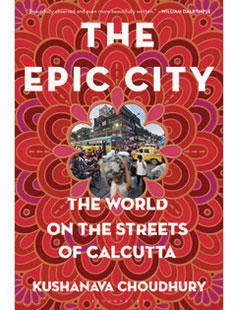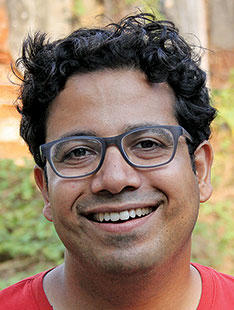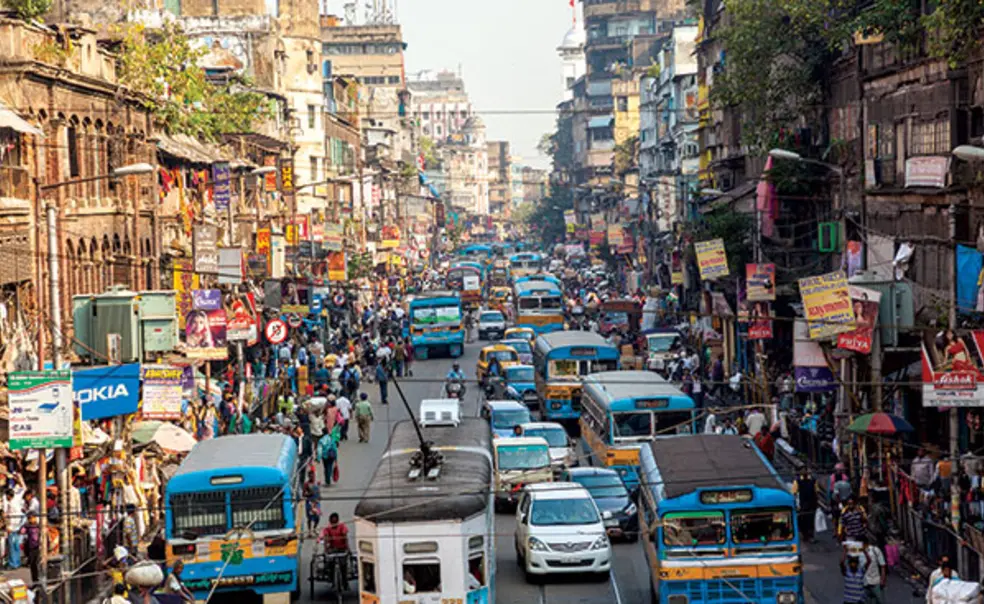
Kushanava Choudhury ’00 grew up in Calcutta and New Jersey. After graduation, he worked as a newspaper reporter at The Statesman in Calcutta. He went on to receive a Ph.D. in political theory from Yale University before returning to Calcutta to write The Epic City: The World on the Streets of Calcutta, “the product of a scholar’s mind, a reporter’s hustle, and a writer’s heart,” he says. Following is an excerpt.
When I was almost 12, my parents and I moved to Highland Park, N.J, from Calcutta, India. My parents expected to go back, like many of their Bengali friends, someday, eventually. On Saturday nights, they gathered at each other’s homes, ate 14-course meals brimming with various types of fish and meat, and derailed each other’s sentences in locomotive Bengali, their conversations full of memories of Calcutta. Return, the duty of return and the dream of return, was spoken of endlessly while eating platefuls of goat curry and hilsa fish. Few actually went back. Nationalism and nostalgia did not pay the bills, raise children, or advance careers. And yet that dream of a return to the great metropolis cocooned them like a protective blanket from the alien world all around.
We had not had an easy few years in America. The man who had offered the job to my father had made promises he did not keep, and so my father was forced to find other work, work he grew to despise. From time to time, there would be talk of another move, to Georgia, to Colorado, and I would pull down the posters in my room and prepare. We stayed put, the three of us adrift in the treacherous shoals of the lower middle class, a world of chronic car trouble and clothes from K-Mart. When, in the fall of my senior year, the acceptance letter from Princeton arrived, my parents acted as if someone had come to our door with balloons and a giant cardboard check. It was their happiest day in America. But it wasn’t mine.
It is probably universally true that education drives a wedge between us and our hometowns, our families, our earlier selves. But for the immigrant the gap is greater, that divergence in mentality more extreme. My trajectory was taking me farther afield, to Princeton, while a part of me was elsewhere, in another country, in another city.
“Princeton in the nation’s service,” University president Woodrow Wilson had said nearly a century before, and when I arrived on campus, that motto had been amended by the sitting Princeton president, to include “and in the service of all nations.”
In Highland Park, rich people had been the tenured Rutgers professors with two-story houses on the north side. They were Volvo-rich. At Princeton I saw the real American aristocracy. I was going to join them. I could graduate from college and within three years be making more money than my parents combined. In a decade, I could be a millionaire. As incoming freshmen, we soon learned about the two true paths to prosperity: investment banker and management consultant. No one told us these things at orientation. It was in the ether and we breathed it in.
Princeton was an amazing social experiment. The search committee scoured the 50 states each year for the most diverse, overachieving, and interesting students they could find, then put them in a social blender for four years and poured them out in two molds. More than half of each graduating class was being siphoned off into banking and consulting. It didn’t matter if you majored in psychology or chemistry, philosophy or art history. As long as you had a Princeton degree, you were cut out for the sheer drudgery of sitting in a corporate office staring at spreadsheets all day. On campus, “service” was generally preceded by the word “community,” and together they suggested a version of what in earlier days was called charity. To serve the nation meant merging and acquiring companies for 70 hours a week, 50 weeks a year in a downtown temple of finance and ladling soup up in Harlem during the holidays. The workplace somehow lay outside the community or the impulse to serve it.

I had worked in newspapers in one form or another since I was 15, fed on their energy and variety, the constant novelty of the game. When we went to Calcutta on a family visit the following summer, I worked as an intern at the city’s leading English daily, The Statesman. It was a fateful choice. Henceforth, I sleepwalked through Princeton, marking time. My education was happening someplace else.
After graduation, while my friends set up apartments in New York, Boston, and LA, I flew back to Calcutta to join The Statesman.
Nothing had changed in the city since my childhood. The mildewed concrete buildings, the bowl-shaped Ambassador taxis, the paintings on the backs of buses, the ubiquitous political graffiti, the posters stuck onto any flat surface, the bazaars full of squatting fish-sellers, the tea shop benches on the sidewalks, the caged balconies of the middle classes, the narrow entrails of corrugated slums, nothing had changed, not even the impassive expressions on the faces of clerks. The city was in its own time zone.
It was not a happy time. Calcutta was in its 23rd year of Communist rule, its third decade of factory closures. Until the 1970s it had been the largest and most industrialized city in India, but had now been eclipsed in population and prosperity by Bombay and Delhi. The only reason politicians seemed to visit the city any more was to pronounce its death.
Since the early 1990s, life in other parts of India had been improving for people like us, the educated few. The government had loosened its hold over the economy, and dollars were flowing into the American back offices and call centers located in Bangalore and Hyderabad. Countless college-educated young men and women, including many of my cousins, had fled Calcutta for these boomtowns. On my mother’s side, none of my cousins remained in the city. I feared visiting relatives. My generation had gone missing, leaving behind a city of geriatrics who busied themselves with bilirubin levels and stool analyses. Their blood-test results were kept in plastic bags as if they were examination mark-sheets or graduation certificates, to be presented to visitors along with tea and biscuits.
Why had I come back? everyone asked.
It would be one thing if I had come back to take care of my ailing parents. But my parents lived in America.
Maybe I did not get along with my parents? asked the bank officer when I went to the local branch to open an account.
Could I not get a job in America? asked the man who ran the copy shop in the bazaar.
Had the Americans, for some reason, thrown me out? wondered a colleague at The Statesman.
Well then, if I must stay in India, they all advised, I had better clear out of Calcutta. If I had any career ambitions at all, I should go to Delhi, Bombay, or Bangalore. After all, even if I had been booted out of America, I had that magic wand that opened all doors in India: a foreign degree.
I knew why I was back, though I did not tell people this, fearing they would scoff at my noblesse oblige, or worse, laugh at my naiveté. Like the revolutionaries of my parents’ generation, I wanted to change things. There was no revolution for me to join, no ideology I could adhere to, no dream left. My best hope for making a difference was to work at a newspaper.
There were few jobs in the city so most people ran some kind of hustle to survive. It might simply be stealing power from overhead lines to run a corner shop or paying off a cop so that you could squat on the pavement selling aphrodisiacs. Then there were the big men’s scams: surgeons charging for bogus operations, builders constructing high-rises with sand passed off as cement, or medical suppliers reselling used syringes to hospitals. Calamity could befall you at any moment in Calcutta. A century-old portico could fall on your head on the way to work, or you could plummet into an unmarked manhole, or be hit by a runaway bus. The only power people had in such moments was in the fury of the mob. If a road accident happened, the driver could be yanked out and lynched, his vehicle doused in kerosene and set ablaze. If a pickpocket was caught, every passer-by would get one free thwack, a consolation for all the everyday tragedies for which there was no justice, no recourse.
As a reporter at The Statesman, sometimes I wrote a few hundred words to make sure that an accident victim’s medical bills were paid by the reckless driver who struck him. Sometimes, all it took was a phone call, identifying myself from The Statesman, and things would happen: justice, fairness or, more often, the water supply would be restored. In a sea of helplessness, newspaper work made you feel like you could be, as the Princeton motto had said, of service.
Excerpted from The Epic City: The World on the Streets of Calcutta by Kushanava Choudhury © 2017 Bloomsbury USA. Reprinted with permission.












1 Response
Chitro Sen
7 Years AgoA True Assessment of Calcutta
Let Kushanava not cap his pen.